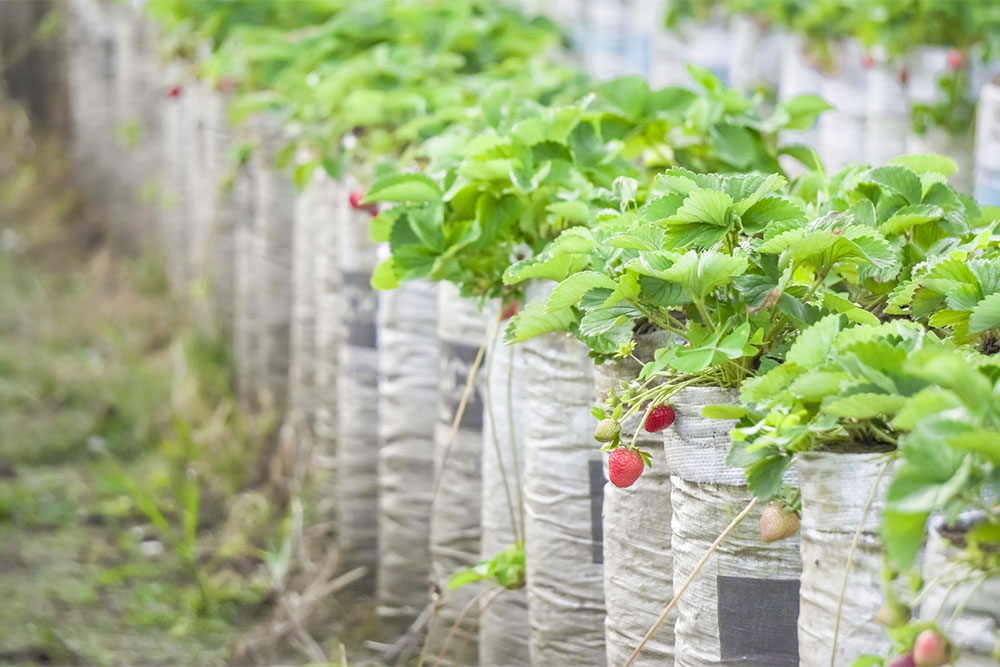Key Things to Know When Fertilizing Strawberry Plants
Gardening is a popular hobby for many people. It helps them relax, calm their minds, and enjoy the activity while growing their own food and flowers. One plant that people like growing in their gardens is strawberries. But, ensuring a good yield can be challenging if one doesn’t know how or when to fertilize strawberry plants. Also, learning about the right fertilizer ingredients and effective homemade fertilizers to use in the process is equally important.
The right time for fertilization
Fall and early spring are the two main periods when one should pay close attention to fertilizing strawberry plants. These seasons are critical as the plants require an extra boost of nutrients to support their growth.

Best fertilization practices
Strawberry plants can be fertilized using either liquid or solid fertilizers during the prime growth stage.
When using granular fertilizers, one should make sure that they are spread evenly. If required, hand-spread the fertilizer across the garden or pots and ensure the water is supplied properly. One can repeat the process twice to four times a week, but limit the process if planted in raised beds. On the other hand, liquid fertilizers need to be mixed with water before application. Use a watering can to sprinkle the mixture onto the soil surrounding the plants and avoid getting any on the foliage. Additionally, after using fertilizers, it is important to clean the produce thoroughly before consuming them. This step ensures that no amount of fertilizers, soil, or other potentially harmful substances is mistakenly ingested.
Choosing the right fertilizer
A well-balanced fertilizer containing the right quantity of nitrogen, phosphorus, and potassium is essential for the healthy growth of strawberry plants. The nutrients are notified on fertilizer labels as NPK. When selecting the right fertilizer to use, read the labels carefully and understand them to make an informed choice. Look for fertilizers with balanced NPK levels that read 10-10-10, 20-20-20, or other similar notations, as they promote healthy root development, strong growth, and bountiful fruit production.
There is a wide range of fertilizers available for strawberry plants. Organic options are also available for those who prefer to avoid harsh fertilizing ingredients found in many commercial products.
- Compost tea
Non-chlorinated water and organic compost are the two things that can make for an effective fertilizer for strawberry plants. The tea can take as much as 10-15 days to be ready for use but can be the best organic homemade strawberry plant fertilizer one can look for. - Coffee grounds
Instead of tossing coffee grounds, use them to fertilize the garden. These grounds have high nutrient value and can provide plants with much-needed nitrogen. They can just as easily be added to the compost pile. - Banana peel solution
This homemade strawberry fertilizer has high nutrient value and can easily provide the plant and the soil with calcium, potassium, magnesium, phosphorus, and trace amounts of certain other minerals. Soaking the peels in water allows it to absorb the beneficial nutrients from the peels. After a few days of soaking, dilute the liquid concoction and use it as a fertilizer. - Fish emulsion
This fertilizer is produced from the liquid remains of a fish and can be used when the foliage of the strawberry plant grows. Mix the emulsion in a gallon of water before using it. It can be better used as a nitrogen supplement and combined with other fertilizers to compensate for the lack of proper quality of phosphorus and potassium. If the plant leaves turn yellow due to low nitrogen supply, the fish emulsion can help make up for the deficiency. - Seaweed extract
Applying seaweed extract can provide the plants with a substantial amount of phosphorous and help them cope with the heat during the summer.
Commercial fertilizers are an easy, convenient, and effective option if one wants to avoid making their own strawberry plant fertilizer. These commercial fertilizers contain a blend of the NPK nutrients in the suggested amount. The number written on the fertilizer bag should be cross-checked since it denotes the quantity of these ingredients. Remember that the numbers are for nitrogen, phosphorus, and potassium, respectively. A 10-10-10 fertilizer is the safest option for strawberry plants. Individuals who are skeptical about these chemical products can opt for organic strawberry fertilizers. These are fertilizer blends that use environment-friendly ingredients and deliver similar results as commercial blends sans the side effects.

